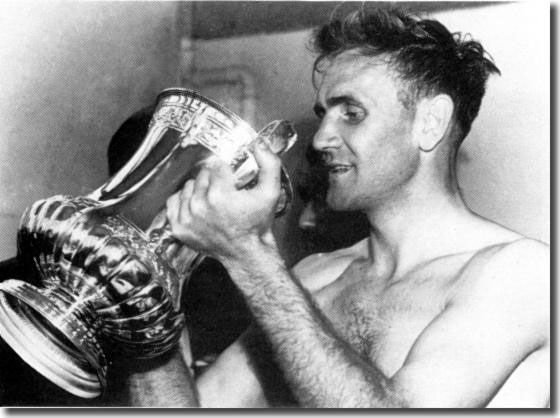 Part 1 An Appreciation - Part
2 Learning the ropes 1927-51 - Part 3 Centre
stage with City 1951-56 - Part 5 On the march
with Leeds United 1961-67 - Part 6 The agony
and the ecstasy 1967-74 - Part 7 Inn-gerland!
1974-77 - Part 8 Disgrace and despair 1977-89
Part 1 An Appreciation - Part
2 Learning the ropes 1927-51 - Part 3 Centre
stage with City 1951-56 - Part 5 On the march
with Leeds United 1961-67 - Part 6 The agony
and the ecstasy 1967-74 - Part 7 Inn-gerland!
1974-77 - Part 8 Disgrace and despair 1977-89
Life was sweet for Don Revie in the summer of 1956. He had enjoyed a
Cup final to remember, inspiring Manchester City's 3-1 victory over Birmingham
as the focal point of the Revie Plan; he had lain to rest the doubts that
manager Les McDowall had always had about him; and he was at the peak
of his career with four goals in his five full England appearances and
a Footballer of the Year award to mark his status. He had last played
internationally the previous autumn but was back in the forefront of public
attention after his return from the shadows of the Maine Road club's reserves.
As he turned 29, Revie was entitled to feel he was at his peak, with the
promise of a good season to come.
The Cup triumph had come as material consolation for City after failing
to do themselves justice for two seasons running in the League. They had
been on the verge of a remarkable Double in 1955, but collapsed in the
spring to leave their long-suffering supporters disappointed once again.
The romance of the Revie Plan and Bert Trautmann's broken neck had given
the fans memories to treasure at last.
McDowall had finally endorsed Revie as his play-maker and chose to kick
off the new season with him in his favoured No 9 shirt, given the freedom
to pull the strings from a deep position. However, City's form was distinctly
dodgy and they lost six games in succession during September and October,
with the only goals coming in a dispiriting 7-3 defeat at Arsenal. McDowall
reacted by pulling Revie back to right-half and drafting Bobby Johnstone
in as centre-forward. A recall to the England side came for Revie in October
1956 for a disappointing 1-1 draw with Northern Ireland, but that was
his sixth and final cap, as he faded out of the picture.
The player's dissatisfaction with his relationship with McDowall had
never really left him and he was getting itchy feet again, his mind continually
preoccupied with the thoughts of the increased earnings a transfer could
bring. As Ken Barnes said, 'I remember him saying when I asked what he
wanted to leave for, "There is one thing that will tell you whether
you have been a good player and that is how much you have got in the bank."'
Revie moved on in November, in a £24,000 deal, back to his native North
East and Sunderland. He left behind him a dispirited team, which continued
to struggle under Les McDowall, continually swapping and changing, never
getting the best out of his talented misfits.
But the transfer brought little to cheer about for Revie. Andrew Mourant:
'There was nothing about Sunderland's form to excite Revie about his playing
prospects. He was in a line of expensive imports bought in to help stave
off a battle against relegation. The team already had players of the calibre
of Len Shackleton, George Aitken, Ray Daniel and Billy Bingham. But Revie
had joined a club which, to some extent, was living on its past glories,
and which carried on as if the next golden age were just around the corner.
Plenty of money was lavished on looking after players in the best accommodation
until they found a permanent home. However, it was nearly 20 years since
Sunderland had won the FA Cup. Sunderland were to endure a struggle even
more arduous than that of 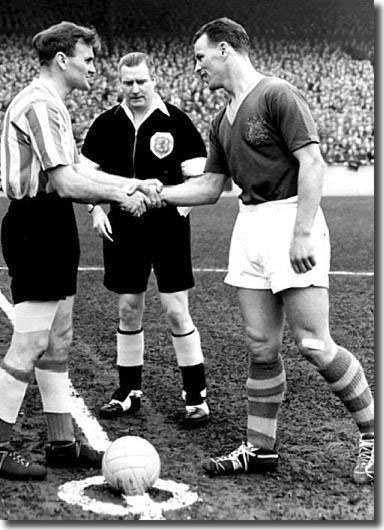 Manchester
City and avoided relegation by just one place. Manager Bill Murray's desperate
attempts to create a winning team failed, and he failed with them, suspended
for life from any involvement in football by the FA following an inquiry
into illegal payments at the club. As the management strove for improved
results, they believed one way was to offer bigger bonuses - £10 instead
of the maximum £4. Bill Murray left, a broken man, to be replaced by Allan
Brown.'
Manchester
City and avoided relegation by just one place. Manager Bill Murray's desperate
attempts to create a winning team failed, and he failed with them, suspended
for life from any involvement in football by the FA following an inquiry
into illegal payments at the club. As the management strove for improved
results, they believed one way was to offer bigger bonuses - £10 instead
of the maximum £4. Bill Murray left, a broken man, to be replaced by Allan
Brown.'
Brown was a forceful and abrasive character and knew what he wanted.
He was not exactly Revie's cup of tea, and the two of them never got on.
However, the player did learn a number of things from the manager, particularly
in terms of self-control. At the end of a particularly poor match at home
to Everton, the crowd turned on Brown and chanted for him to go. He came
out to face them down at the end and Revie was to say 'It was just terrible,
and as we trooped off the pitch I happened to look up into the stand,
and saw Allan Brown sitting there while the crowd was chanting for his
blood, and he never moved a muscle or displayed the slightest emotion.
I remember being most impressed by his magnificent self-control, and I'm
certain I learned a great deal from him in that unhappy moment.'
back to top
As the club's assistant trainer Jackie Jones recalled, 'I think Brown
tried to run the team with a little bit of fire but he didn't succeed.
The players had too many different temperaments. He had good players sitting
in the stands but was bringing in youngsters. Allan Brown was very strong-willed...
even if the team lost seven or eight nothing, he would still play the
same way.'
Amidst all the anger and arguments, Revie at least lived up to his reputation,
although he was often on a different wavelength to his team-mates. Half-back
George Aitken recalled: 'He was a great player ... he was forever trying
to make the rest of the team play. Don took the game very seriously ...
and he would try to help people and give a bit of advice.' Jackie Jones:
'Don was a great asset. He didn't have a lot to say but I think he was
reasonable ... he was a thinker.'
However, the club was in desperate straits. They managed to escape the
drop in 1956/57, but the following season saw them relegated to Division
Two. Hurley (from Millwall), Pearce (Luton Town), Kitchenbrand (Glasgow
Rangers) and Grainger (Sheffield United) all cost the Roker Park club
sizeable fees as they vainly attempted to retain the distinction of being
the only club to have unbroken First Division status throughout their
League history, but the inevitable fall came. Following relegation, Allan
Brown opted for hard work and the energy of youth to restore glory. Inside-right
Charlie Fleming recalls, 'Brown expected his youngsters to play a hard-running,
chasing game, rather than allowing the ball to do the work. Instead of
running five yards and passing the ball 20 he got them to run 20 and pass
the ball five. And he would coach us in heading and trapping the ball
... things that kids could do.'
Don Revie did not fit Brown's promotion blueprint and he was quickly
discarded to the reserves. He was never one to stay where he was not wanted
and was soon packing his bags once more, throwing in his lot with humble
Leeds United, a mediocre club maybe, but one who could still boast First
Division status. In November 1958, 31-year-old Revie was signed for £14,000
by caretaker manager, Bill Lambton, who had
taken over from Revie's former idol Raich Carter
when the United board declined to renew the Silver Fox's contract the
previous May.
It was something of a surprising move for a former England international,
as there was little to attract him to Elland Road. Leeds were perennial
also-rans who had been temporarily revived by the performances of John
Charles before his record move in 1957 to fame with Juventus. With him
had gone the club's heart and spirit. They finished 17th in his absence
and were represented by a dispirited collection of unproven youngsters
and cynical older pros.
Revie was the indisputable star in this drab firmament. Argumentative
centre half Jack Charlton, the stylish Grenville Hair, Irish international
Wilbur Cush and young Chris Crowe were the pick of the bunch, but none
of them could match the pedigree of the newcomer.
Earlier that same month, the Yorkshire Evening Post's Tom Holley
had noted, 'United's big need sticks out a mile. They have no one who
can control the game in midfield. It is an old, old Elland Road story,
but a really good inside man could be United's salvation, and give them
the breathing space they so badly need.' Revie was one of two proven big
names whom United were tracking to fill the gap.
Richard Ulyatt of the Yorkshire Post: 'Leeds United have been
interested in (Revie) for a long time, and so have Middlesbrough, who
will be at once disappointed and vexed, perhaps to the point of outspokenness,
that he preferred to move to Leeds instead of Teesside where, they thought,
he could finish his footballing days in his home town.'
The lure of a return to the First Division was what persuaded Revie to
ignore the romantic notion of playing for the club of his birthplace,
as was hinted at by the Yorkshire Evening Post's Phil Brown: 'Revie
is now the player for whom most money has changed hands in Football League
transfer fees. Up to today £68,000 has been spent on him - £20,000 by
Hull City when they bought him from Leicester City, £24,000 by Manchester
City when they bought him 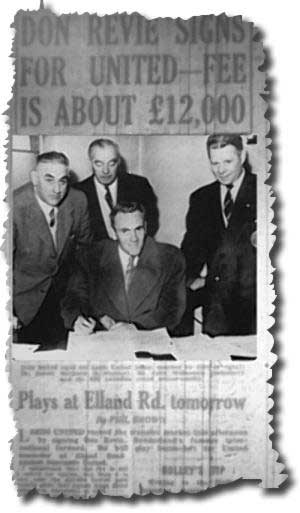 from
Hull City, and £24,000 by Sunderland when they bought him from Manchester
City. The previous most costly player was Trevor Ford at £69,000.
from
Hull City, and £24,000 by Sunderland when they bought him from Manchester
City. The previous most costly player was Trevor Ford at £69,000.
'He is one of the best users of the ball the post-war Soccer scene in
the United Kingdom has known, and his spray of passes, long or short,
has cut many a defence to ribbons, and relieved his own rearguard, too.
'Revie played at Rotherham last Saturday and had a tremendous part in
his side's 4-0 win, their first away this season. In Mr Allan Brown's
controversial efforts to rebuild the Sunderland side, however, that manager
has not always seen eye to eye with Revie, or favoured his style of play
- facts which may have helped the famous forward to make up his mind to
come to Leeds and Sunderland to release him. Like so many skilful players,
he believes the First Division is his football 'home'. And he certainly
ornamented it since he entered it with Manchester City six years ago last
month. He gained all told six caps after that.
'After arriving at Elland Road today Revie … said: "I am very happy
to be back in First Division football again, especially with a team in
my native Yorkshire." He is to live in Sunderland until a house can
be found for him in Leeds - the search will start right away, said United's
publicity director, Harry Reynolds. Revie said that he was quite prepared
to travel to Leeds to train with the rest of the team until he got fixed
up. Mrs Revie hopes to find a job with the Leeds Education Authority.'
back to top
Revie's debut on 29 November brought a 3-2 victory against Newcastle,
with Ulyatt writing of 'Revie with his deft through passes just in front
of his team mates of a type which no Leeds forward has made or received
in the 25 years I have been watching them.' Centre-forward Alan Shackleton
had netted a hat trick a week earlier to secure a much-needed 4-2 win
at Blackburn, but before then, just three victories had been achieved
in 17 matches. A further three wins in the following four games temporarily
boosted Leeds' spirits before they lapsed back into a familiar malaise.
Revie was unsurprisingly accorded much of the credit for the improvement
in form, which helped get Bill Lambton the full-time post of manager.
Eric Stanger wrote in his Yorkshire Post review of a 3-2 win at
West Ham, 'Revie, on Saturday's form, is the man United have wanted for
years, even in the days of John Charles. He supplied that essential link
between attack and defence which has so often been lacking. He was the
co-ordinator, the Johnny-on-the-spot, bolstering up his half-backs when
need arose and often transforming defence into attack with his shrewd
strokes. Revie not only has that undefinable quality we call class but,
on this occasion at least, the knack of making others play all the better
for his presence.'
Six weeks after Revie's arrival Wilbur Cush stood down as club captain,
and the players unanimously selected Don Revie as the new skipper. He
was delighted by the show of support, saying, 'I feel honoured and will
give the job all I can on the field and off.' The move might have marked
a revival, but Leeds never struck anything like decent form, limping in
to a dismal 15th place, with only three wins in the final four games papering
over the cracks. The diffident fan base drifted away and there was only
one crowd in excess of 20,000 from the end of January.
Despite the depressing atmosphere, Don Revie had settled well and his
experience proved invaluable in the Leeds midfield. He had lost his pace,
but his mind was as quick as ever and he could 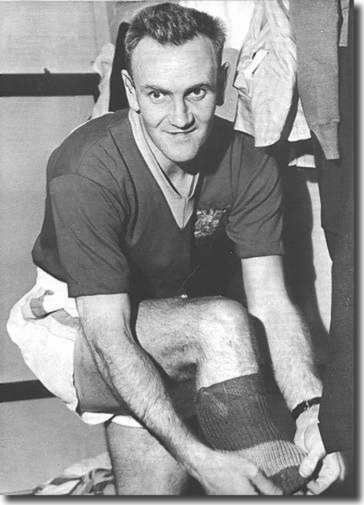 still
pull the strings sufficiently well to hide the worst aspects of a mediocre
team.
still
pull the strings sufficiently well to hide the worst aspects of a mediocre
team.
Bill Lambton lost his job before the end of the season and QPR manager
Jack Taylor became the new manager after a succession
of candidates turned down the post. He brought precious little respite
to an embattled Elland Road.
Andrew Mourant: 'Revie was now being deployed at inside-left, inside-right
and right-half. In 20 matches, he scored just two goals. The following
year, he settled down at inside-right, save for a run of six matches at
centre-forward as stop-gap for Alan Shackleton, the previous season's
top scorer with 16 goals in 28 games. He had been bought from Burnley
a month before Revie's arrival but moved on to Everton just eleven months
later. John McCole was bought from Bradford City to replace him but despite
scoring 22 goals in 33 games, could not stop the rot. Leeds' fragile hold
on the First Division was finally to give way. The club, increasingly
debt-ridden and with primitive facilities, had not given a convincing
impression of belonging in the top flight. Among the notable aspects of
that wretched season were that in a brittle defence - 92 goals conceded
- Jack Charlton, already something of a veteran having had six years at
the club, missed just one League game. It was also the season that Billy
Bremner was blooded by Jack Taylor, as a right-winger. He played in eleven
games and scored two goals.'
Revie's relationship with the little Scottish winger was to be a key
feature of the next 15 years, and from the moment that Bremner figured
in Taylor's first team plans, the older man took him under his wing, recognising
his potential and promise. It was a case of Revie trying to do for Bremner
what others had done for him. He had soaked up wisdom throughout his career
from such mentors as Sep Smith and Raich Carter, and sought in turn to
pass on his knowledge to the youngster. Bremner repaid the debt a thousand
times over in the years to come, but in those days he was immature and
homesick. The experience and tutelage of Revie was a vital factor in helping
him settle down at Elland Road.
Another player who benefited substantially from the former England man's
arrival was Jack Charlton, then a prickly character who did not react
well to authority.
Leo McKinstry: 'Jack Charlton's early years at Leeds had been characterised
by rows with players on the field and with managers off it. In the late
1950's and early 1960's his belligerence became even worse. Pig headed,
boorish and aggrieved, he made life awkward for all around him. Full of
his own opinions, he was intolerant of the views of others, almost becoming
something of a bully.'
The conformist Don Revie found himself continually at odds with the tearaway
defender, and was perturbed by his attitude and rebellious streak. He
abhorred players who could not curb their individual instincts for the
good of the team and often found himself at odds with Big Jack. Revie
was to write, 'When I joined Leeds United as a player, I was amazed to
find how undisciplined Jack was. He was one of the most awkward customers
it had ever been my misfortune to meet. Whether it was because the club
had never had much success or not I have no idea. But in all matches,
Jack wanted to run about all over the place. He seemed to think that if
he didn't do it, no one else would.'
Revie was often so exasperated that he found himself tearing a strip
off his colleague. After one match in which Charlton had been guilty of
his normal trick of racing about aimlessly, Revie snapped, 'The best thing
that could happen to you would be for the club to leave you out. You're
ruining it for the rest of us with that chip on your shoulder. If I were
manager, you'd never do for me.'
Charlton characteristically retorted, 'Well, you're not the manager,
so what the hell!'
The early differences would eventually be forgotten, but in Don Revie's
first few months at Elland Road, the enmity between the two men seemed
irrevocable. Charlton admired Revie and his thoughtful approach, but would
not publicly acknowledge the fact.
Following relegation, Revie gave up the captaincy to former Manchester
United defender Freddie Goodwin, convinced that his appointment had brought
bad luck. In the more mundane climes of the lower division, Revie's contributions
became less and less regular, and he only appeared 14 times as he began
to consider his next career move.
Revie had been considering a future role as a manager for some time.
Eric Thornton recalls an incident from the time Revie won his first England
cap in 1954 in his book, Leeds United And Don Revie: 'Always a
quiet thinker, even when others around were talking clap-trap after big
games, he was peering ahead even immediately after winning a first cap.
Which is why I'll never forget as the plane from the Belfast International
touched down at Ringway one cold autumnal night, he suddenly turned to
me and said: "I've been thinking how I'd like to have a crack at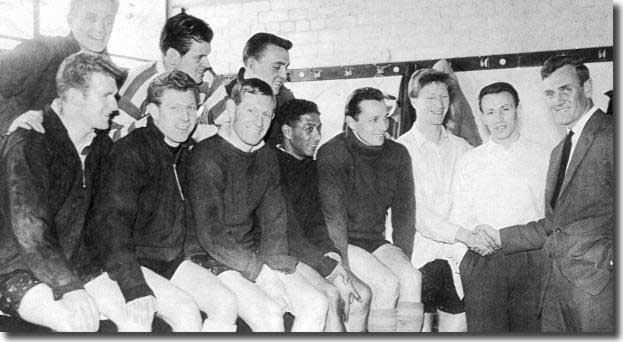 managing when the playing days are over."'
managing when the playing days are over."'
back to top
Rob Bagchi and Paul Rogerson from The Unforgiven: 'Anxious to
secure a player-manager's job as his onfield career drew to a close, it
was cursorily reported that he had applied for just such a post at Bournemouth
in February 1961. But Revie's reputation as one of the game's more cerebral
individuals had spread much further afield. Chester City and Tranmere
Rovers also entered the running for Revie's services. Then, three weeks
before he took over at Elland Road, Revie was invited to become player-coach
of the semi-professional Australian club Adamstown, near Sydney, on a
five-year contract. The New South Wales club offered to fly Revie, Elsie
and their two children out to Australia, provide them with a house and
find Revie work outside football. He would also receive a salary as part-time
coach. The offer was declined, however. A more unlikely "cobber"
could not be imagined. Barbecues and Bondi Beach would never have appealed
to the home- and hearth-loving Don.'
In the end, the answer for Revie came closer to home. Senior director
Harry Reynolds was increasingly influential behind the scenes at Elland
Road and prompted Jack Taylor to resign in March 1961. Just days later
the enthusiasm of Reynolds was sufficient to persuade the board to offer
33-year-old Don Revie the chance to begin a new career as player-manager
at Leeds United.
The two men had developed a strong bond during trips with Jack Taylor
to look at prospective signings, and were to create a partnership that
transformed the West Yorkshire club. Taylor had been a disastrous appointment,
and had been anything but first choice after Bill Lambton. Chairman Sam
Bolton had unsuccessfully attempted to attract Charlie Mitten of Newcastle
United, Archie Macauley of Norwich City, Bob Brocklebank of Hull City,
Willie Thornton of Dundee and non-League Headington United's Arthur Turner
before he eventually turned to Taylor, and relegation had made the Elland
Road job even less attractive. They were in desperate straits when the
board turned to Revie.
The story is often told that Reynolds was asked by Revie to write him
a reference for the player-manager's job at Bournemouth and stopped halfway
through the letter, tearing it up as he realised Revie's merits, resolving
instead to offer him the job at Elland Road. In reality, Bournemouth had
second thoughts when the United directors asked for £6,000 in compensation.
A desperate Leeds board knew that Revie would be prepared to accept their
offer and were impressed by his progressive ideas. He was given a three-year
contract, with his pay pegged at the £20 a 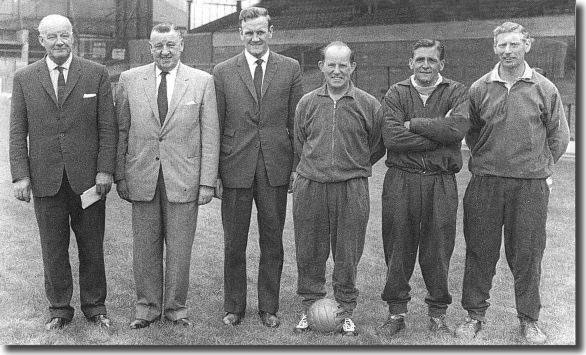 week
maximum allowed for players. It was noticeable that the package was considerably
less favourable than that Taylor had enjoyed. Revie was keen on the opportunity
and gladly accepted, but was not impressed by the directors' parsimony.
Such a slight was not easily forgotten and he brooded uneasily on it for
years.
week
maximum allowed for players. It was noticeable that the package was considerably
less favourable than that Taylor had enjoyed. Revie was keen on the opportunity
and gladly accepted, but was not impressed by the directors' parsimony.
Such a slight was not easily forgotten and he brooded uneasily on it for
years.
However, there was no bitterness evident at the time, just expressions
of the mutual admiration between directors and player-manager.
Rob Bagchi and Paul Rogerson: 'Revie described his new job as a "real
challenge ... I am very pleased with my contract," he went on, confirming
it gave him "full power on selection, transfers in and out, training
- all aspects of the work necessary to get a good playing staff."
Cyril Williamson was left to handle purely administrative matters. And
the new manager also offered an immediate insight into his philosophy:
the attention to detail for which he was to become notorious. "I
shall try to get defensive systems and attacking systems that will operate
throughout all our teams" he told the Yorkshire Evening Press
on the eve of his first game in charge. "Any players moving up from
one team to another will know just what is wanted."'
The club might have been a modest one with little obvious hope for the
future, but Revie actually had a lot going for him. As well as the support
and money of wealthy directors, the new man could look forward to enjoying
the benefits of the youth development and scouting schemes introduced
by Bill Lambton and nurtured by Jack Taylor; he could also count on high
quality backroom staff.
The previous manager had recruited coach Syd Owen and trainer Les Cocker,
lieutenants who would shape Revie's forces and prepare them for battle.
Bagchi and Rogerson: 'Les Cocker, the former Stockport County and Accrington
Stanley forward, had learnt, like so many of his contemporaries, the fundamentals
of fitness in his wartime service with the Reconnaissance Regiment in
France after D-Day. He was temperamentally and professionally qualified
for the position of trainer. One of the first generation to take the FA
Coaching Certificate, he had a stormy start with his new charges, who
were contemptuous of his dedication to their development. Yet barely a
year after joining Leeds, he was summoned to Lancaster Gate and offered
the prestigious job of putting England squads through his revolutionary
sequence of sadistic drills, a position he was to occupy from 1962 right
through to 1977. Fanatical and often abrasive, there was a touch of zealotry
in his soul. His loyalty was unreserved and he brought structure, obstinacy
and a certain impassive relentlessness to his task, which was to become
the cornerstone of Leeds' physical authority.
'Cocker was rather more than the stereotypical 'sergeant major' coach,
but there is little doubt that, more often than not, he played that role
to perfection. However, it was the more cerebral Owen who actually conducted
the technical sessions. A full England international, along with Cocker,
he had joined Leeds from Luton Town in the summer of 1960 to help 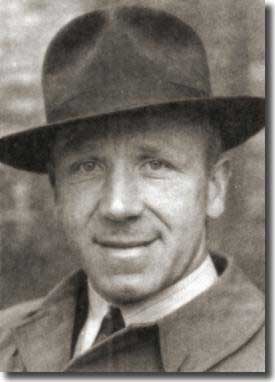 Taylor's
beleaguered team achieve promotion in their first season back in the Second
Division.
Taylor's
beleaguered team achieve promotion in their first season back in the Second
Division.
back to top
'Unlike Cocker, he had a distinguished pedigree both as a player and
a coach, and had actually, briefly, been a manager himself. Having been
sacked by Luton Town after less than a year in charge, he was impatient
in his desire to prove that the progressive methods he had discovered
at Lilleshall could be a success as much on the field as on the blackboard.
He, too, had problems imposing his more modern philosophy on the conspicuously
cynical Charlton, but eventually, after one episode when Jack "offered
to take my coat off to him", Charlton realised that he was rapidly
beginning to unleash his dormant potential under Owen's shrewd instruction.'
If it was Revie's fortune to have such strong supporters around him,
it was to his credit that he gave them their head and capitalised on their
qualities, relying absolutely on them for more than a decade. He also
chose, characteristically, to spend time learning his new trade, and contacted
Matt Busby, one of the country's premier managers, then still in the process
of rebuilding Manchester United after the disaster of Munich. A week after
being appointed Leeds manager, Don Revie arranged a meeting at Old Trafford
with Busby and sought his advice and help. Busby spoke at length of his
philosophies and beliefs and advised Revie to 'establish a consistent
coaching pattern throughout the club', so that younger players, as they
were blooded in the first team, would be already well schooled in the
way that Revie wanted to play. He took the lessons to heart and went away
ready to face his new challenge.
The spectre of a relegation struggle defeated, Don Revie spent the summer
of 1961 pondering how he could transform his club after the image of the
Manchester United family he so admired.
Part 1 An Appreciation - Part
2 Learning the ropes 1927-51 - Part 3 Centre
stage with City 1951-56 - Part 5 On the march
with Leeds United 1961-67 - Part 6 The agony
and the ecstasy 1967-74 - Part 7 Inn-gerland!
1974-77 - Part 8 Disgrace and despair 1977-89







 Part 1 An Appreciation - Part
2 Learning the ropes 1927-51 - Part 3 Centre
stage with City 1951-56 - Part 5 On the march
with Leeds United 1961-67 - Part 6 The agony
and the ecstasy 1967-74 - Part 7 Inn-gerland!
1974-77 - Part 8 Disgrace and despair 1977-89
Part 1 An Appreciation - Part
2 Learning the ropes 1927-51 - Part 3 Centre
stage with City 1951-56 - Part 5 On the march
with Leeds United 1961-67 - Part 6 The agony
and the ecstasy 1967-74 - Part 7 Inn-gerland!
1974-77 - Part 8 Disgrace and despair 1977-89 Manchester
City and avoided relegation by just one place. Manager Bill Murray's desperate
attempts to create a winning team failed, and he failed with them, suspended
for life from any involvement in football by the FA following an inquiry
into illegal payments at the club. As the management strove for improved
results, they believed one way was to offer bigger bonuses - £10 instead
of the maximum £4. Bill Murray left, a broken man, to be replaced by Allan
Brown.'
Manchester
City and avoided relegation by just one place. Manager Bill Murray's desperate
attempts to create a winning team failed, and he failed with them, suspended
for life from any involvement in football by the FA following an inquiry
into illegal payments at the club. As the management strove for improved
results, they believed one way was to offer bigger bonuses - £10 instead
of the maximum £4. Bill Murray left, a broken man, to be replaced by Allan
Brown.' from
Hull City, and £24,000 by Sunderland when they bought him from Manchester
City. The previous most costly player was Trevor Ford at £69,000.
from
Hull City, and £24,000 by Sunderland when they bought him from Manchester
City. The previous most costly player was Trevor Ford at £69,000. still
pull the strings sufficiently well to hide the worst aspects of a mediocre
team.
still
pull the strings sufficiently well to hide the worst aspects of a mediocre
team. managing when the playing days are over."'
managing when the playing days are over."' week
maximum allowed for players. It was noticeable that the package was considerably
less favourable than that Taylor had enjoyed. Revie was keen on the opportunity
and gladly accepted, but was not impressed by the directors' parsimony.
Such a slight was not easily forgotten and he brooded uneasily on it for
years.
week
maximum allowed for players. It was noticeable that the package was considerably
less favourable than that Taylor had enjoyed. Revie was keen on the opportunity
and gladly accepted, but was not impressed by the directors' parsimony.
Such a slight was not easily forgotten and he brooded uneasily on it for
years. Taylor's
beleaguered team achieve promotion in their first season back in the Second
Division.
Taylor's
beleaguered team achieve promotion in their first season back in the Second
Division.